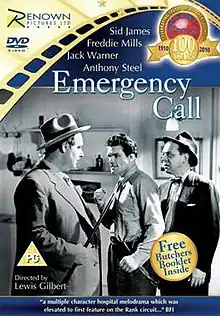Emergency Call (1952 film)
Emergency Call is a 1952 British drama film directed by Lewis Gilbert and stars Jack Warner in a familiar role playing a policeman, Anthony Steel, Joy Shelton and Sid James as a dubious boxing promoter.[2][3]
| Emergency Call | |
|---|---|
 DVD cover | |
| Directed by | Lewis Gilbert |
| Written by | Lewis Gilbert Vernon Harris |
| Produced by | Ernest G. Roy |
| Starring | Jack Warner Anthony Steel Joy Shelton Sid James |
| Cinematography | Wilkie Cooper |
| Edited by | Charles Hasse |
| Music by | Wilfred Burns |
Production company | Nettlefold Films |
| Distributed by | Butcher's Film Service |
Release date |
|
Running time | 84 minutes |
| Country | United Kingdom |
| Language | English |
| Budget | £20,000[1] |
It was shot at Nettlefold Studios and distributed by Butcher's Film Service. The sets were designed by the art director Bernard Robinson. The film was a noted success compared to its small budget and helped establish Gilbert as a director.[4] It was remade in 1962 as Emergency starring Glyn Houston.[5]
Synopsis
The film centres around a race against the clock to locate three blood donors each able to donate one pint of a rare type of blood to save the life of a young girl suffering from leukaemia. The doctor in charge of treating the girl enlists the assistance of police officer Inspector Lane in order to assist in the search for suitable donors. The three donors are each from very different backgrounds, a white boxer, a black sailor, and finally a murderer who has been on the run from the police for a number of years. The boxer's donation is fairly straightforward, having only to avoid his manager, the sailor's donation is more complicated, following a war-time incident where a dying Nazi soldier refused to accept his offer of a donation which he attributes to racism, he initially refuses to donate, until it is explained to him that the Nazi officer refused his donation for reasons that can be attributed to the Nazi's master race ideology.
The final donor is a murderer on the run from the police, living under an assumed name. The police eventually locate the man and he suffers a gunshot injury. He must choose to donate the last pint of blood needed and die at the scene from blood loss, or to refuse to donate in order to receive treatment in hospital but with the knowledge he will surely be found guilty of murder at trial and sentenced to death. The criminal chooses to donate and the young girl survives.[2][5]
Cast
- Jack Warner as Inspector Lane
- Anthony Steel as Dr. Carter
- Joy Shelton as Laura Bishop
- Sid James as Danny Marks
- Earl Cameron as George Robinson
- John Robinson as Dr. Braithwaite
- Thora Hird as Mrs. Cornelius
- Eric Pohlmann as Flash Harry
- Sydney Tafler as Brett
- Geoffrey Hibbert as Jackson
- Henry Hewitt as Mr. Wilberforce
- Vida Hope as Brenda
- Avis Scott as Marie
- Freddie Mills as Tim Mahoney
- Peggy Bryan as Ward Sister
- Bruce Seton as Sergeant Bellamy
- Anna Turner as Mrs. Jackson
- Nosher Powell as Boy Booth
- Campbell Singer as Sergeant Phillips
- Nigel Clarke as Superintendent Travers
- Iris Vandeleur as Mrs. Flint
Production
Both Warner and Steel were loaned out from the Rank Organisation; the two men worked together again with Gilbert on Abert RN[6] Real life boxer Freddie Mills played a boxer.[7]
Release
Variety said "story strikes an original note."[8]
The Monthly Film Bulletin said it "adds up to a fairly exciting ninety minutes."[9]
Abner Greshler bought the rights to distribute the film in the US as The Hundred Hour Hunt. He also announced he signed Gilbert and Steel to make a film in Hollywood, The Black Robin. This did not eventuate.[10][11]
References
- "Of human Bondage". The Guardian. 10 March 2000.
- "Emergency Call (1952)". Archived from the original on 26 September 2012. Retrieved 14 August 2007.
- "BFI / Film & TV Database / EMERGENCY CALL (1952)". BPI. Archived from the original on 16 January 2009. Retrieved 14 August 2007.
- Screen: Of human Bondage Lewis Gilbert is best known for his three Bond films but as he celebrates his 80th birthday he tells Nicholas Jones about a lifetime in the movies and how he almost made The Godfather Jones, Nicholas. The Guardian; London (UK) [London (UK)]10 Mar 2000: FRIDAY10.
- "BFI / Film & TV Database / EMERGENCY CALL (1952)". Archived from the original on 26 January 2009. Retrieved 14 August 2007.
- Vagg, Stephen (23 September 2020). "The Emasculation of Anthony Steel: A Cold Streak Saga". Filmink.
- "Studio chatter". The Mail (Adelaide). Vol. 42, no. 2, 099. South Australia. 30 August 1952. p. 21 (Sunday magazine). Retrieved 12 September 2020 – via National Library of Australia.
- Review of film at Variety
- EMERGENCY CALL Monthly Film Bulletin; London Vol. 19, Iss. 216, (Jan 1, 1952): 79.
- THOMAS M. PRYOR (4 September 1952). "COLUMBIA PLANNING SIR GALAHAD MOVIE: Technicolor Adventure Film to Be Called 'Quest of the Holy Grail' -- Adler to Produce". New York Times. p. 24.
- Schallert, Edwin (29 June 1953). "Anthony Steel Heading Here for 'Black Robin'; Alan Hale Jr. on Stage". Los Angeles Times. p. B7.
External links
- Emergency Call at IMDb
- Emergency Call at the British Film Institute
- Emergency Call at TCMDB
- Emergency Call at Letterbox DVD